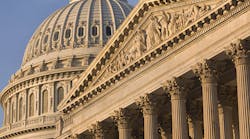Latest from Contractor Marketplace
Latest from Contractor Marketplace
Copper Journal Report: Metals Markets Facing Headwinds
Sept. 30, 2019
Sponsored
Sponsored
(Photo by Chris Maddaloni/Getty Images)
We’ve come to know and love the IAPMO Group’s Vice President Dain Hansen for his takes on the world of politics as it relates to contractors. This week, Hansen took a look at some of the biggest political issues to keep an eye out for in 2015. Here is his top 20 list:
- Republicans will try to pass a series of energy bills designed to boost U.S. energy production and independence, beginning with the approval of the Keystone XL Pipeline in January
- Congress will move very early in January to pass an extension of the Treasury Department’s terrorism risk insurance program (TRIA) after efforts to extend the program derailed in the Senate late last year.
- Intense oversight. Many oversight hearings will begin in January, but the broad oversight focus will be constant throughout the year. Many of these hearings will expand current investigations on contentious subjects such as Benghazi, IRS targeting of conservative groups, Obamacare and the prisoner swap involving Sgt. Bowe Bergdahl.
- Congressional Republicans are sensitive to the politics surrounding government shutdowns, so they will make a major effort to keep government funded through the passage of individual appropriations bills for the various departments as a new fiscal year approaches in October.
- Foreign policy to be a key focus. The President’s new policy on Cuba, the cyber-hacking at Sony, negotiations over Iran’s nuclear program, and the rise of ISIS, fighting in Middle East, North Korea and Russia will all be subject to high-profile hearings early this year.
- A number of high-profile nominations, including those for Attorney General and Secretary of Defense, remain outstanding, so confirmation hearings will have increased intensity.
- The House and Senate will schedule votes to repeal Obamacare in the first quarter of the year. Even if it passed the Senate, a full repeal bill would be vetoed by the President. Republicans will then move to a strategy of voting on separate bills to repeal individual provisions of the law, beginning with elimination of the medical device tax, one of the various new taxes in the law to pay for expanded health care coverage. Expect a lot of small bills attempting to peel apart the law.
- Both the Senate and House have new budget committee chairmen who will push for fiscal restraint. Senate Republicans will likely employ a budget reconciliation process that could give them an avenue to expedite the passage of budget-related legislation.
- There is lofty and hopeful bipartisan talk swirling around tax reform in 2015 and this will remain. The reality is that the details of tax reform are extremely complex and often divisive.
- The debt ceiling has been suspended until March 15. At that time, Congress will have a few weeks or months to extend the debt ceiling or risk default on the nation’s debt.
- Despite President Obama’s recent executive order affecting the status of nearly five million people in the country without proper documentation, there is still pressure in the Congress to act on both legal and illegal immigration reforms.
- A bipartisan compromise on ways to reform government surveillance practices and activities was almost enacted in 2014. Lawmakers will try again in 2015. At the heart of this issue is what role should federal intelligence agencies play in gathering and monitoring intelligence.
- Lawmakers will talk about passing a five or six-year highway bill to pay for needed highway and other road infrastructure improvements since the current Highway Trust Fund expires on May 31.
- The controversy over reauthorization of the Export-Import Bank (Ex-Im) once again will rear its head since Congress only extended funding for the agency until the end of June.
- Expectations are high in 2015 for major U.S. trade agreements with Europe and Pacific Rim nations to get across this finish line.
- Even as regulators build out and apply a dizzying array of tools and requirements to reduce the likelihood and mitigate the impact of the failure of large financial institutions, the issue of “too big to fail” will be taken up with renewed interest in the new Congress.
- Efforts to make a wider set of amendments to the Dodd-Frank Act will be redoubled. The list of potential Dodd-Frank changes range from controversial ones (such as the defanging of the Consumer Financial Protection Bureau) to more modest ones that already have passed the House with widespread bipartisan support.
- With growing public awareness of the dangers of cyber-attacks, Congress will continue to concentrate on this serious problem.
- Democrats, still nursing the wounds of midterm election defeat, will look to cobble together a mix of policy proposals that are appealing to middle-class voters.
- Politics will, of course, shape all of the issues above (and others), while also creating new ones. Although only a handful of House elections are likely to be super competitive in 2016, the Senate is likely to be a different story.
Voice your opinion!
Voice your opinion!
To join the conversation, and become an exclusive member of Contractor, create an account today!
Sponsored Recommendations
Sponsored Recommendations

